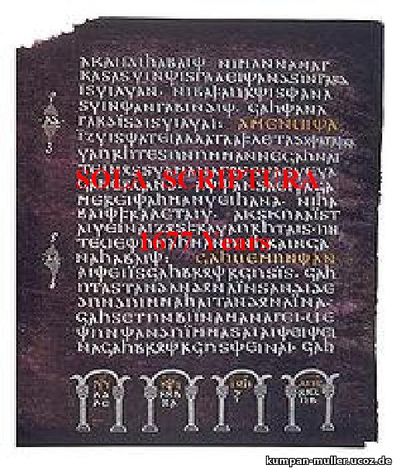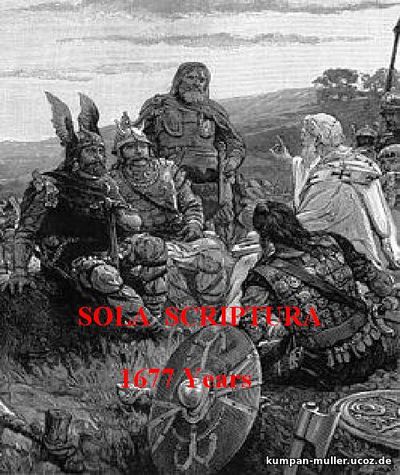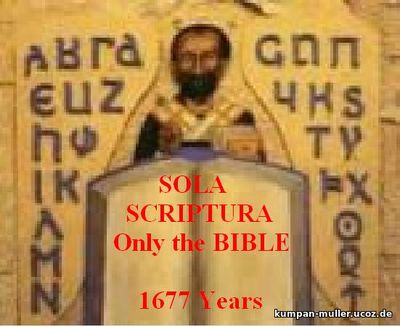Alexander Vasiljev-Muller Dr.econ(PhD)
Publisher
| Главная » Статьи » Litawa-Gothia-Odessa//Литва-Готия-Дженестра /Pavel Antonovich Vasiljev & Pelagej Danilovna Polansky |
In 2017, Christians celebrated the Five Hundred (500) years of the Reformation, and in 2018 it is possible to celebrate by the Universal Church and 1677 years the main idea of the REFORMATION - Only the BIBLE With the ideas of Martin Luther in the sacral triangle of the Normano-Gotha Confederation, KALMIUS: Mariupol (Kremnes) -Bahmut (Bulavinsk) - Of course, this process does not happen the way the descendants of the Kazakov-Gotov forefathers would like to remain on this territory. Unfortunately, not those often put emphasis and motivation of the shepherds themselves are not so crystal perfect. And they do not always come to the service on the call of the heart, and often it happens ... for the "humanitarian". But all this can be attributed to "permissible costs", because the reformer BURST has been building the main road to seekers through the last five hundred years through all "selfish emotional blockages" and its creative impulse does not run out in surprise to all skeptics and atheistic ignoramuses. Why is this happening? What was so great about the monk Martin Luther? Was there not even a hint of a reform tsunami before him that would activate the spiritual quest of Christians in That's right, it all started with 95 theses of Dr. Martin Luther and Vladimir Ivanovich Vernadsky stressed that only thanks to a whole cluster of real technological innovations it was possible to inform the public of Europe about the essence of Martin Luther's idea (the invention of a composite cast font, the creation of volatile typographies that could be gathered almost into a bag and so on) and they were not forgotten, but laid the foundation for such a serious renewal of the CHRISTIAN. But the realization of the idea - to bring the word of God to every person in a language understandable to him - for Germany, as for all of Europe, has a more ancient history, which began with Metropolitan Gothia Ulfila in 341. It is this year that the translation of the BIBLE into Gothic (which is still today understood by all Germans) the language ordained in http://azov-academy.ucoz.org/publ/stati_i_nauchnye_publikacii_articles_science/perdzhuzeppe_skardili_quot_goty_jazyk_i_kultura_quot/3-1-0-254), which is presented by Perdzhuzeppe Skardili "Goths: language and culture "makes a strong impression, opening for us the unknown historical worlds of the spiritual formation of European civilization. By the way, SOLA SCRIPTURA ("only the Scriptures") all 500 years of reformation is considered a key principle. And Mikhail Sergeyevich Grushevsky * gave, you can say, almost highly artistic and somewhat poetically generalized summary of the importance of the Reformation to It is believed that the European world all these 500, like modern Ukraine today, understood the impossibility of positive social and economic development without constant reform and, first of all, without reforms in the hearts of people. The latter and carried out the constant reformatory activities of the Christian Church. And if the last 500 years of reformism is associated for the majority of Christians with Protestantism, then practically all the preceding centuries of Christianity, this activity was carried out by Martin Luther-scale personalities, whom we in the first quarter of the 21st century do not simply need to remember, but also pay tribute to their spiritual and civil feat in the name of preserving our civilization. We have in view of the famous Metropolitan Gothia on the Crimean Peninsula (340) Wulfil (Ulfil), who for 1276 years (almost 13 centuries) before Martin Luther made the first translation of the Bible into German, then called Gothic (but any German can perfectly understand the contents of the translation done today). And if today, celebrating 500 years of the Reformation, started with 95 Martin Luther theses and his original translation of the Bible into German, which transformed the Christian World into innovative workshops of modern civilization, the translation of the Bible by Wulfil (Ulfil) into Gothic (German) language marked the beginning of a vibrant civilizational The activities of Gothic alliance in the whole of modern Europe and in Asia. Thus, Pierciusseppe Scardilly, Goths: Language and Culture, writes: "The Gothic culture of the time of Vulfila (Ulfily) characterizes vitality and energy, no matter what we find in any part of the Western world (which at the time was distant from the classical tradition, but , on the other hand, still not mature enough for conversion by Christianity). The flowering of their own Gothic culture can only be judged correctly if one recalls the temporary leap ahead of the related phenomena, which in general should be viewed as the result of renewal and the political sphere. Let us recall the Ireland of St. Patrick, France Gregory of Tours, England, the Troubles of Honor, Germany St. Boniface and we will consider the difference: it consists, inter alia, in that the (written) language of all these authors was Latin, while the culture of Vulfila and his direct receivers bears This is a Gothic imprint, and this is what distinguishes it. How much later Anglo-Saxon, German, Slavic languages proved to be able to directly express the thinking of these nationalities and tribal unions that are in the stage of becoming, not to mention the Romance languages! ... a characteristic feature of Gothic culture, which should be discussed, is its central role. The Goths were regarded as bearers of culture, who early achieved recognition and highly deserved respect. So the Gothic world, which was primarily associated primarily with the tribes of the German North (along with this, of course, with the rest of the Germans), later influenced the immediate neighbors - the "Germans"; so he became for a long time for the rest of the Germanic tribes a mediator in the transfer of new knowledge, which he acquired again and again. There were countless points of contact, which made it possible to maintain a connection between the Goths and the rest of the Germans; This was not in the least due to the general inclination of all Germans to poetic (literary) transmission of historical events. In this the Goths were masters, and in this we see the influence that they exerted on others, and at the same time is their main role: if we look at what events of the past were at the center of general interest in the early medieval "Germany", then we will encounter with those associated with the Goths. An exemplary example of this is the legends from Attila in the German heroic saga and heroic epic, about Attila, who was not Germanic, but with the Goths was in a positive and lasting connection "(pp. 8-9). And the fact that the Goths, inspired by the Reformed spirit of the first Bible translation made by Vulfila, were constantly learning from the wise for those times of Asia, says the colossal spiritual potential of this people - "The Goths gathered their experience in the vast expanses of Central and Of course, in the modern world today there is no Gothic state and to defend this point of view, as well as an objective and unbiased view of the history of Europe and That's why, we suggest that in 2018 we mark the 1677th anniversary of the main reforming principle of SOLA SCRIPTURA ("only the Scripture"), realized by Metropolitan Gothy on the Crimean peninsula by Wulfila (Ulfila) in 341 of the Nativity of Christ. We hope that not only all the reform movements, but also the Catholic, Greek Catholic and That's why, we suggest that in 2018 we mark the 1677th anniversary of the main reforming principle of SOLA SCRIPTURA ("only the Scripture"), realized by Metropolitan Gothy on the Crimean peninsula by Wulfila (Ulfila) in 341 of the Nativity of Christ. We hope that not only all the reform movements, but also the Catholic, Greek Catholic and
THE HONORARY CHAIRMAN of Civil international Committee Intellectual and Spiritual Unity, Dr Ernesto Garcia The chairman of Civil international Committee Intellectual and Spiritual Unity, Director of Institution of economical and socio-culture researchers (cessionary DESMC The academy of science of Dr econ., high scies empl. A.V.Vasiljev The Vice-chairman of Civil international Committee Intellectual and Spiritual Unity, Web-boss www.сiс-wsс.org Julio Atance _______________________________ * Mikhail Sergeevich Hrushevsky (1886-1934) - Ukrainian historian, public and political figure, from the family of priests and Russian-Ukrainian professors. It is considered to be one of the leaders of Ukraine, the chairman of the Ukrainian Central Rada, the professor of the Lviv University (1894-1914), the member of the Czech Academy of Sciences and Arts, the academician of the Academy of Sciences of the USSR and the Academy of Sciences of the USSR, a member of the NTSH, after being arrested and staying for a little more than a year in Lukyanovka Prison. Officially considered in ** Vulfila (Ulfila, gothic.Wulfila, dr.-Greek Οὐλφίλας, Οὐρφίλας, Latin Ulfilas, Vulfilas, Gulfilas, Ulphilas) - bishop is ready, the creator of the Gothic alphabet. We have received significant passages from all four Gospels (the Gospel of Mark entirely) and the Epistles (2 Corinthians entirely), but only a very small remnant of the Old Testament translation (the books of Ezra and Nehemiah). The Goths already had runic letters, but they were not enough, on the one hand, and on the other hand their connection with the rituals of the pagan cult made their application undesirable when translating the Bible. As a result, Vulfila created his own alphabet, based on the Greek letters of his time, supplemented by some signs of the Latin and runic alphabets. The Old Testament was translated into Gothic from the Greek translation (Septuagint), and the New - from the Greek original, and some influence of the Latin translation is noticed. The Gothic translation is very close to the original in its linear construction, although it does not obey blindly. Errors and false interpretations are rare. The performers of the Gothic translation managed to use for their work all the richness and diversity of the forms of the Gothic language and thus created an exemplary German prose that formed the basis for the further development of the Gothic script. Источник: http://azov-academy.ucoz.org/publ/ | |
Категория: Litawa-Gothia-Odessa//Литва-Готия-Дженестра /Pavel Antonovich Vasiljev & Pelagej Danilovna Polansky | Добавил: Vasiljev (2018-05-30)
| Автор: A.Vasiljev,E.Garcia  
| |
| Просмотров: 1080 | Теги: | Рейтинг: 5.0/1 | |
| Всего комментариев: 0 | |
Форма входа |
|---|
Категории раздела | |||||||
|---|---|---|---|---|---|---|---|
|
Поиск |
|---|
Наш опрос |
|---|
Статистика |
|---|
Онлайн всего: 1 Гостей: 1 Пользователей: 0 |
Друзья сайта |
|---|
|
|


